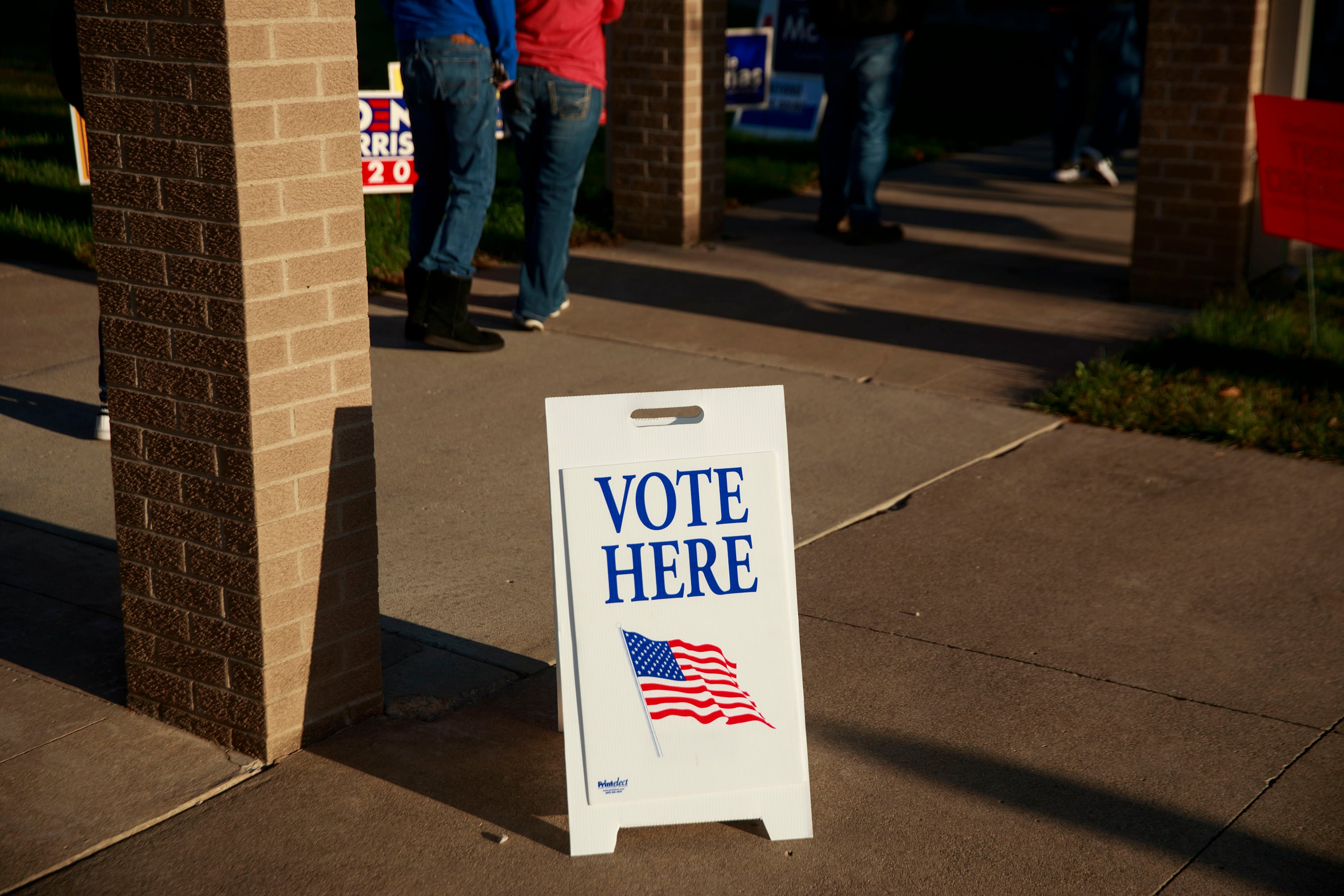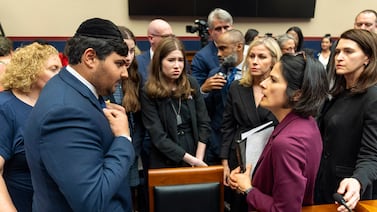Sign up for Chalkbeat Indiana’s free daily newsletter to keep up with Indianapolis Public Schools, Marion County’s township districts, and statewide education news.
This voter guide was updated May 1 to include Fremont Community Schools’ referendum.
This May, four Indiana school districts will ask voters to approve funding to do things like raise teacher pay, continue programs supported by pandemic relief that will soon expire, and improve school safety.
These ballot measures seeking tax revenue will be on the primary election ballots on May 7 in Blue River Valley Schools, Brown County Schools, Fremont Community Schools, and the Metropolitan School District of Pike Township.
School districts can seek voter approval for referendums to pay for operating costs, as well as construction and safety expenses. They need a simple majority to pass.
The ballot language shows the percentage that school property taxes would increase from the base amount going to schools, not the percentage that property taxes overall would increase.
Additionally, a law enacted last year requires school districts in Marion, St. Joseph, Vanderburg, and Lake counties to share revenue from ballot measures for operating costs with charter schools. That law applies to one district on May 7, Pike Township, which is the first district in Marion County to hold a referendum since this law went into effect.
Here’s what to know about each district’s referendum:
Pike wants to fund pandemic programs, attract teachers
Rate: $0.24 per $100 of assessed property value for eight years
Estimated annual revenue: $14.5 million
For the first time, Pike Township is asking voters to help fund operations. The tax rate would be 24 cents per $100 of net assessed value for eight years.
The ballot measure would fund three key areas: continuing programs and staffing added since the pandemic, attracting and retaining teachers, and school safety and security.
Out of the total funding, $4.5 million would continue programming and keep staff who are supported by federal COVID relief.
The funding would cover everything from 1:1 computing devices and academic interventionists to social workers and a new curriculum to help students cope with traumas outside the classroom. It would support salaries and benefits for nearly 60 staffers.
“The funds are going away, but the needs are still very much there,” said Pike Superintendent Larry Young said.
Another $9 million would help Pike Township offer competitive salaries and attract top educators to the district, Young said. The funding would cover instructional staff, but also custodians and secretaries.
Finally, an estimated $1 million would pay for additional school resource officers and safety personnel to the district, although Young said there’s not a specific number. It would also fund security upgrades, including a security system that multiple people can walk through at once.
Pike must share referendum funds with charter schools that enroll a student living in the district and opt in.
However, 15 charters are seeking to receive money from Pike’s referendum, according to school board documents. If they ultimately do, the schools collectively will receive more than $412,000 annually of the estimated $14.5 million. The largest amounts would go to Indiana Math and Science Academy (roughly $81,000) and Herron Charter (roughly $71,000).
The average assessed value for a homeowner in the school district is $237,200, which means the referendum’s average tax increase would be $295.20 annually.
Property owners can also use this calculator on the Pike Township Schools website to see how much their taxes would change if the ballot measure passes.
Reviving career education, theater in Brown County Schools
Rate: $0.10 per $100 of assessed property value for eight years
Estimated annual revenue: $1,879,051
Brown County schools is seeking a renewal of its 2016 operating referendum, but at a slightly higher rate than before — 10 cents per $100 of assessed property value for eight years, rather than eight cents.
The referendum would generate around $1.9 million in annual revenue for the district, with the bulk of the funding earmarked for salaries, benefits, and programs, according to the district’s spending plan. Around $188,000 will be set aside for programming at a Career Resource Center.
One of the largest expenditures — around $650,000 — is a plan to increase teacher salaries by $5,000 in order to make the district compensation more competitive, according to a district presentation. Their salaries in Brown County schools start at just over $40,000 a year.
Another $255,000 is earmarked for a 5% pay bump for non-certified staff to increase retention, and $356,000 would go to sustaining current and future salary levels.
The remaining $423,000 would fund new positions in special education, career and technical education, arts, and work-based learning. Some of this funding will allow Brown County schools to reinstate career and technical education classes, as well as theater at Brown County High School.
The district enrolled around 1,500 students in 2024 — a drop of over 300 students since 2018. A presentation from the district says that the enrollment drop has meant a loss of $2.3 million in funding, but that costs don’t necessarily decrease when the number of students decreases.
Brown County voters rejected the district’s most recent operating referendum proposal in 2022.
Blue River Valley seeks increase in teacher pay
Property tax rate: $0.19 per $100 of assessed value for eight years
Estimated annual revenue: $359,594
Blue River Valley Schools, which serves a portion of Henry County, plans to make its teacher pay more competitive if the first ballot measure for operating costs it’s ever put to voters gets approved.
Declining student enrollment and a state-mandated limit on property tax revenue has created a financial strain on the district — particularly in its quest to attract and retain high-quality teachers, the district said in a presentation to voters. Recent enrollment figures from Superintendent Trend McCormick indicate about 570 students, compared to the nearly 700 students it had in 2018-19.
Meanwhile, the $40,000 starting salary for teachers is the lowest among school districts in Henry County and neighboring Wayne County, according to the district.
The district’s average salary of $49,995 is also below the state’s average of $58,531 for 2023.
The district plans to use the additional revenue to increase pay for its roughly 41 teachers by at least $5,000 over two years; it would increase starting salaries to $45,000, McCormick said. The district hopes to offer a $2,500 raise in the fall of 2025 and another $2,500 raise in 2026.
The referendum would be an annual tax increase of $111.27 for a property valued at $138,100, the average residential value for homes in the district, according to the district’s referendum calculator.
Fremont Schools want to attract, retain teachers
Rate: $0.15 per $100 of assessed property value for eight years
Estimated annual revenue: $2,384,719
After voters narrowly rejected the district’s attempt to renew its referendum in 2023, the Fremont Community Schools in Steuben County is trying again with a lower rate.
The district received enough signatures from voters to hold another referendum without the waiting period required by Indiana law.
Due to the district’s debt reduction efforts, many voters may actually see a decrease in their property taxes earmarked for schools, said Superintendent William Stitt, who added that his own taxes would decrease by $60 annually.
The bulk of the 2024 referendum — around $1.66 million — is earmarked for retaining and attracting teachers and staff.
That’s the district’s top priority, Stitt said. While many districts have struggled with labor shortages, Stitt said Fremont schools started the last two years with every position, from teachers to bus drivers, filled.
Without those funds, teachers may face layoffs leading to larger class sizes, according to the district’s referendum materials. Science, special education, and English as a second language positions would be at risk, and programs for at-risk students and gifted and talented students would be reduced.
“We want to keep those people, and that means being competitive and having competitive salaries,” Stitt said.
The district enrolls just under 1,000 students and has 158 teachers and staff, according to its website.
Referendum funds will also help the district maintain its after-school and extracurricular programs, and allow schools to hire new teachers.
Approximately $424,000 will go to academic programming, while the remaining $300,000 is needed to enhance school security according to the district’s spending plan and other materials.
Stitt said this may include an emergency alert system for teachers and staff that does not depend on cell service, which can be spotty in Fremont, he said.
Correction May 7, 2024: A previous version of this story gave an incorrect figure for the annual revenue that Brown County schools’ referendum would raise. It would raise around $1.9 million.
Aleksandra Appleton covers Indiana education policy and writes about K-12 schools across the state. Contact her at aappleton@chalkbeat.org.
Amelia Pak-Harvey covers Indianapolis and Marion County schools for Chalkbeat Indiana. Contact Amelia at apak-harvey@chalkbeat.org.
MJ Slaby oversees Chalkbeat Indiana’s coverage as bureau chief. She also covers access to higher education and Warren Township Schools. Contact MJ at mslaby@chalkbeat.org.






